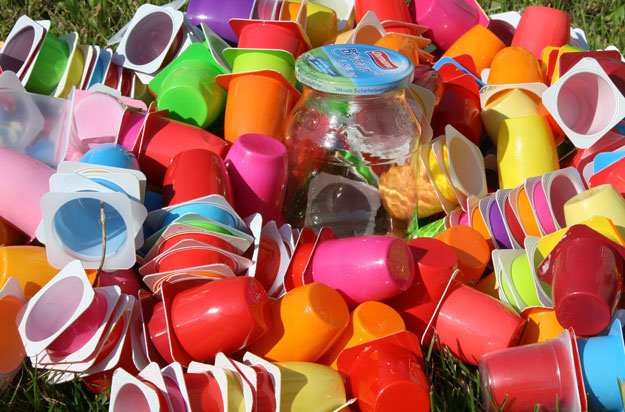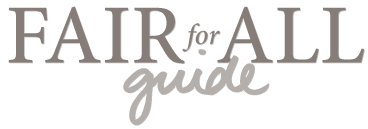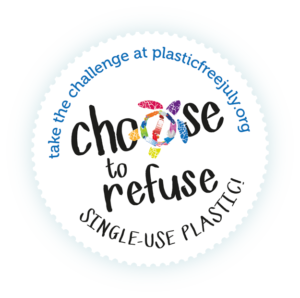
I recently joined the Facebook group Zero Waste Indy, a forum for sustainability-minded Indianapolis residents to share their ideas and strategies for reducing their personal waste. It’s been really interesting to see everyone’s solutions, and last week fellow group member and blogger Polly Barks posted about an initiative I hadn’t heard of before: Plastic Free July.
Plastic Free July is a month-long campaign being promoted by different sustainability organizations worldwide. The official Plastic Free July website is run by Earth Carers of Western Australia, and the challenge is also promoted by the Story of Stuff. The goal of Plastic Free July is to challenge yourself to refuse single-use plastic in your daily life.
Packaging is a major source of plastic waste, and as I started Plastic Free July, I realized it’s harder to totally avoid than I thought. I went to the farmers’ market on Saturday and got produce in my reusable bags as I’ve done for years, but then after I bought a loaf of bread, I was halfway home before it occurred to me that the bread was in a single-use plastic bag.
Obviously, packaging is only one facet of a product’s overall environmental footprint. I’m on the fence about how to handle bread, because there are other bakeries that sell their bread in paper bags, but I’ve found that those loaves of bread get stale more quickly. I don’t want to end up wasting food in the name of reducing packaging. One solution could be to buy a loaf in a paper bag and transfer it to a heavier-duty reusable plastic bag when I get home to help it stay fresh. Ultimately if I wanted the most sustainable, packaging-free bread, it would probably be best to bake it at home. I’m not that much of a Betty Crocker yet, but maybe one day!
Despite the fact that packaging should be considered alongside the other environmental factors of a product, Plastic Free July is still a worthwhile campaign to bring awareness to the myriad pieces of plastic we use unthinkingly throughout the day, which add up to a significant plastic waste problem. A recent article in the Guardian provides an in-depth look at the world’s plastic waste crisis. Growth in the use of disposable plastic has far outpaced the capacity of recycling programs to keep up, so curbing our use of plastic is just as necessary as recycling what we do use.
One thing I would like to do intentionally starting this month is to more actively refuse plastic straws at restaurants. Right now if the server hands them out, I leave mine on the table, but I don’t know if it gets picked up to be used by someone else or thrown away. When I order my drink I’d like to get in the habit of saying “No straw, please.” Other ideas I may try include carrying a fork in my purse to use when only plastic cutlery is available, and investigating buying olive oil in bulk to avoid the use of a plastic bottle.
What plastic do you notice yourself using on a regular basis? What can you cut out of your routine during Plastic Free July? Share your answers in the comments, and use hashtags #plasticfreejuly and #plasticfreeindy to share your progress on social media all month long.


